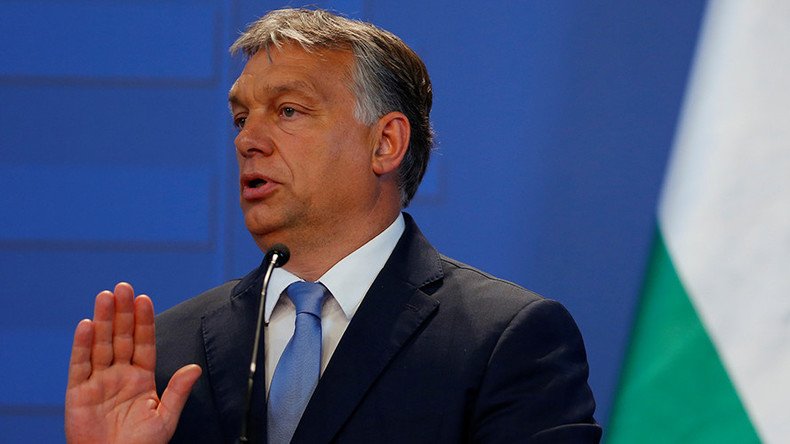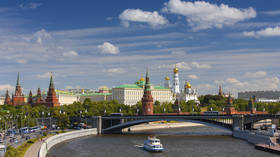Reports of Hungary’s slide into ‘dictatorship’ have been exaggerated

Is Hungary sliding into tyranny and dictatorship? According to headlines which have painted a rather grim picture of Hungary’s present and future under Prime Minister Viktor Orban, the answer is a resounding yes.
Hungary is “held hostage” by “tyrant” Orban who is returning the country to “totalitarianism,” claims The New Statesman. The International Business Times worries about Hungary’s “dark path toward dictatorship”.
The EU struggles to contain “dictator” Orban, says the Sydney Morning Herald. Orban is Europe’s “enemy within,” warns the Financial Times. He is “Europe’s New Dictator,” says Politico.
These attention-grabbing headlines and dramatic portrayals exaggerate the political situation in Hungary. Of course, there are plenty of legitimate complaints to be made about Orban (though, naturally, the specifics of the complaint will vary based on who is speaking). The problem is that the media has taken those complaints, exaggerated and embellished them, and used them to predict this country's slide into absolute tyranny irresponsibly. This distorts reality and lessens the readers’ ability to understand what is going on in Hungary.
Brussels likes to believe it promotes democracy within the 28 EU member states. Yet, when Orban begins to implement policies that they don’t like (but that his voters support), he becomes an outcast. Those shouting “dictator!” fail to take into account the wishes of the many Hungarians who voted for Orban’s reelection in 2014 and who support many of his policies. Disregarding the will of the people to score ideological points about democracy is ironic indeed.
Let’s break it down.
Hungarian PM Orban pledges to support Poland against ‘European inquisition’ https://t.co/9GAoCzB8TE
— RT (@RT_com) July 22, 2017
Elections
When considering the legitimacy of the claim that Hungary is sliding into dictatorship, we should start with the basics.
Orban is a legitimately elected prime minister. The freeness of recent elections in Hungary has not been called into question. Following the latest parliamentary elections in 2014, which saw Orban and his conservative political alliance re-elected, there was debate (within Hungary, I should add) over whether undue advantage was given to the ruling Fidesz party through a combination of factors — including gerrymandering districts and biased media reporting.
No doubt these factors do give an advantage to the ruling party, but it would not be entirely unfair to compare this to the undue advantage afforded to the two mainstream parties in the United States. Democrat and Republican candidates enjoy massive free media coverage and an immediate sense of legitimacy, while third-party candidates are all but shunned and treated as an amusing sideshow by mainstream media. The US regards itself as the greatest democracy in the world. As for gerrymandering, it is hardly a Hungarian phenomenon.
Overall, the OSCE monitors of Hungary’s parliamentary elections concluded that Hungarians “were offered a genuine choice” in “competitive elections.” They said the process was “transparently and efficiently administered”. The OSCE criticized the “partisan composition” of the National Election Commission and media regulations which favored Fidesz but said the candidate registration process was inclusive. Interestingly, Western coverage focused only on the OSCE’s criticisms, failing to give a full picture which included improvements to the system.
Ultimately, when Hungary holds elections, candidates from across the political spectrum win seats — from the governing party, from the left and right wing opposition — and occasionally independents. Sometimes the polls predict outcomes accurately, other times they are off. None of this is typical of a dictatorship.
Media freedom
One of the major criticisms of Orban is that he has destroyed free media in Hungary. It is true that Hungary’s media environment is not free from state interference. State media act, by and large, as free advertising and propaganda for Fidesz and Orban. There is often pressure put on independent media and Orban allies have been busy buying up media outlets.
Nonetheless, it is completely untrue to suggest that Orban has managed to decimate the free press entirely. There are plenty of available outlets that dedicate a lot of their time to bashing the ruling party, online and in print and radio. Independent journalists regularly unearth cases of government corruption — and anyone is free to read them. Hungarians are more than aware of government corruption and are not happy about it. Public opinion in 2016 showed that 56 percent of people believe the government only pursues corruption selectively.
In 2014, the government shelved a plan to introduce a tax on internet data usage after pressure through massive street protests. The protesters argued that levying fees on internet usage would restrict access to free information — and the protesters won. At the time, the BBC wrote that Orban was “more flexible than many analysts give him credit for.” Typically, street protests don’t work in dictatorships.
If international rankings are your cup of tea, take a look at the 2017 Reporters Without Borders press freedom index. Hungary does not rank particularly well — but Greece, Israel and Japan rank worse.
CEU controversy
One of the biggest criticisms of Orban came this year over the controversy surrounding the George Soros-founded, Budapest-based Central European University.
The controversy was caused by an amendment to the law on higher education which meant the university would no longer be allowed to issue diplomas accredited in the United States unless it operated a campus there. Until now, it has been allowed to do just that.
This naturally made the university highly marketable to students. But non-CEU students were at a disadvantage, according to the government’s argument.
The law change was framed as a total and utter assault on freedom. Reports in Western publications made it sound as though the university was being forced to shutter its doors on the spot for no reason — or simply because of its association with Orban foe Soros. In reality, the university will not be forced to close. It will be compelled to comply with a new law which removes part of its competitive advantage (issuing US accreditation). Whether you believe this is fair or not, it is hard to argue the reporting on the controversy gave a full and balanced picture.
The law prompted huge street protests; some of the biggest Budapest has seen in years. There is no question a lot of Hungarians are fired up against Orban over the CEU move. But that is not the opinion across the board. While on the one hand, I’ve seen Hungarians waving signs comparing Orban to Hitler, I’ve also spoken to Hungarians who support the amendment to the education law, completely agreeing with the position that CEU should not be afforded any sort ‘special treatment’.
Calling Orban a dictator or tyrant over something like this again disregards widespread opinion in favor of ideological point-scoring.
An opinion poll in May saw the ruling party and Orban’s personal support drop since the CEU spat in January — but that could also be to do with other things; like the fact that half of all Hungarians can’t afford a one-week foreign holiday.
Israel backs Hungary’s anti-Soros campaign, saying financier ‘continually undermines Jewish State’ https://t.co/ksOiPRdcQt
— RT (@RT_com) July 16, 2017
Refugee policy
The policy that has caused Orban to be most reviled by many Western democracies, however, has been his decision to refuse to comply with an EU resettlement plan for hosting refugees across member states.
But again, Orban is not alone in his thinking. A referendum in 2016 saw 98 percent of Hungarian voters say ‘no’ to Brussels’ EU migrant quotas. Turnout, however, was low, at about 44 percent — below the 50 percent required to make the referendum valid under the law.
Orban’s commentary on refugees has been inflammatory; some would argue outright racist. But racist and inflammatory commentary doesn’t make one a dictator — especially when 98 percent of people who showed up to vote agree with you.
Regardless, Hungary is pushing ahead with its stance on illegal immigration, even holding those who enter the country in detention centers at the border. The government claims it is doing this to uphold the Schengen agreement which is being “abused” as migrants travel freely to reach their country of choice in Western Europe. The country also built a fence along its border with Serbia hoping to lower the number of refugee crossings.
This again is a subject which deeply divides people and ignites passions. But believing Orban’s policies on migration are cruel or immoral does not make him a dictator. What’s more, it’s ludicrous to ignore that his policies are in line, for the most part, with the will of the people.
Incidentally, Orban is also accused of fueling extremism and anti-Semitism. While he certainly does whip up nationalist fervor, it is misleading to call him an anti-Semite. It is rarely pointed out that Orban’s government introduced a Holocaust memorial day, compulsory Holocaust education in schools and made Holocaust denial illegal.
Slap in the face
Western reporting frequently fails to give a full picture of the situation in Hungary in much the same way it does about any country that fails to live up to arbitrarily set standards for what constitutes a ‘good’ or a ‘bad’ country.
Unfortunately, some in the Hungarian opposition fuel unbalanced portrayals of the country because the louder they shout, the more vehement Western journalists will shout with them — and the more attention they will receive.
What I have been struck by, having spent the last ten months in this country, is that this is not the way average Hungarians seem to think of their country. Many are of course vehemently anti-Orban, many are pro-Orban. But even those against him are often baffled by Western coverage.
The late Imre Kertesz, the first Hungarian winner of the Nobel Prize for Literature, decried talk of dictatorship in Hungary as “empty ideological language.”
In a 2014 interview with The Hungarian Quarterly, Kertesz revealed that a reporter from the New York Times had called him “with the intention of getting me to say that Hungary is a dictatorship today, which it isn’t.”
“That only means that he [the reporter] has no idea what a dictatorship is. If you can write, speak openly, openly disagree, even leave the country, it is absurd to speak of a dictatorship,” Kertesz said.
“I am not pleased with everything happening in Hungary. I do not think there was ever a time when I was pleased with everything happening here but certainly, Hungary is no dictatorship. This is empty ideological language to call Hungary a dictatorship today.”
Most notably, Kertesz said the interview in which he failed to call his country a dictatorship was never published — and that in itself “is a kind of censorship.”
Exaggerating Hungary’s political situation distorts not only the present but the past. To speak of Orban’s “dictatorship” is a slap in the face to those who lived and still do live under real dictatorships.
The statements, views and opinions expressed in this column are solely those of the author and do not necessarily represent those of RT.

















